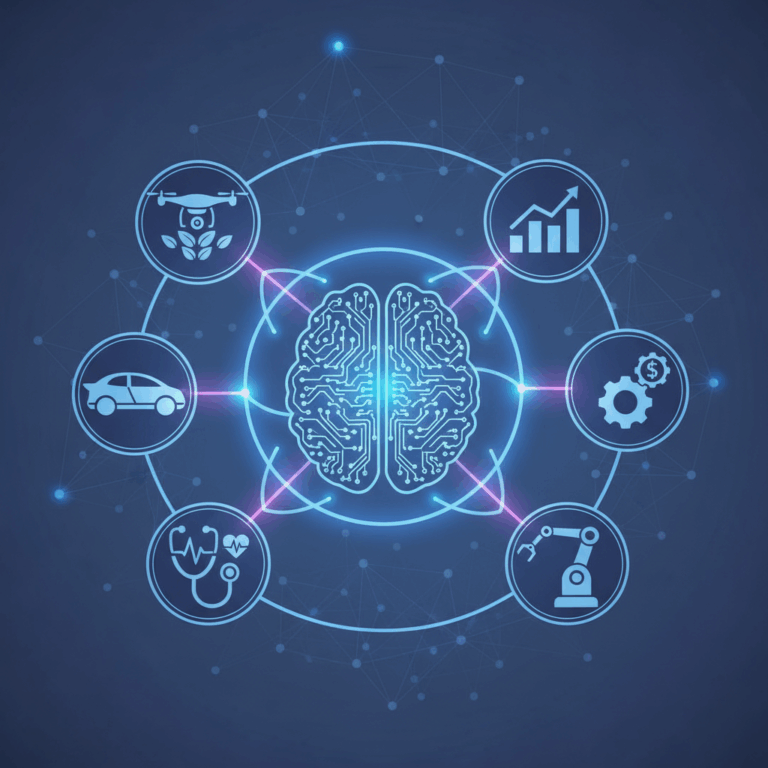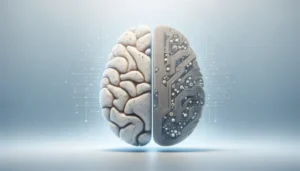Industries Leading in Deep Learning Use
The use of deep learning has expanded across many industries, profoundly transforming how businesses operate. Key sectors include healthcare, entertainment, finance, retail, manufacturing, and automotive.
These industries leverage deep learning for tasks like data analysis, automation, and personalized solutions. This has led to improved efficiency, safety, and better customer experiences globally.
Focusing on healthcare and entertainment, deep learning drives innovations that enhance diagnostics, treatment, and user engagement using detailed data insights and adaptive algorithms.
Healthcare Innovations Through Deep Learning
Deep learning in healthcare enables advanced disease detection and diagnosis, improving the accuracy of medical imaging analysis for conditions such as cancer. Early detection is increasingly feasible through these technologies.
This powerful technology also supports personalized treatment plans and accelerates drug discovery, helping tailor healthcare solutions to individual patient needs and improve outcomes significantly.
Improved diagnostic tools powered by deep learning aid doctors in making faster, more reliable decisions, ultimately advancing the overall quality of care within hospitals and clinics worldwide.
Entertainment and Personalized Experiences
Entertainment companies employ deep learning algorithms to analyze user preferences and browsing history, creating highly personalized content recommendations on platforms like Netflix and Spotify.
These systems adapt continuously, enhancing the user experience by delivering relevant movies, music, and shows, which increases engagement and satisfaction across diverse audiences.
Deep learning also enables dynamic content creation and optimization, helping entertainment providers remain competitive by quickly responding to changing consumer tastes and trends.
Deep Learning Applications in Business Sectors
Deep learning is revolutionizing business sectors by providing powerful tools for data-driven decision-making and automation. It helps companies optimize operations, reduce risks, and enhance customer experiences.
From finance to retail and manufacturing, deep learning applications enable smarter insights, predictive analytics, and personalized services that drive growth and increase competitive advantage in dynamic markets.
Businesses implementing deep learning gain efficiency and agility by automating complex tasks and improving accuracy in risk management, customer interaction, and operational safety measures.
Financial Services and Risk Management
In financial services, deep learning enables more accurate fraud detection by analyzing vast transaction data, uncovering hidden patterns that traditional models might miss. This strengthens security for institutions and consumers.
Risk assessment benefits from deep learning’s ability to process large datasets and market trends, improving predictions for credit scoring and investment decisions, thereby reducing financial losses and enhancing portfolio performance.
Algorithmic trading utilizes deep learning models to analyze market behavior and execute trades at high speed, helping firms capitalize on market opportunities with improved precision and lower latency.
Retail Enhancements and Customer Interaction
Retailers apply deep learning to offer personalized product recommendations by analyzing customer behavior and preferences, which increases engagement and sales conversion through targeted marketing strategies.
Cashier-less store technologies leverage deep learning for real-time item recognition and inventory tracking, creating seamless shopping experiences that reduce wait times and operational costs.
Demand forecasting powered by deep learning improves inventory management by anticipating customer needs, minimizing stockouts, and optimizing supply chain logistics to boost overall efficiency.
Customer service chatbots, driven by deep learning, provide instant support and resolve queries effectively, improving customer satisfaction while reducing reliance on human agents.
Manufacturing Efficiency and Safety Measures
Deep learning enhances predictive maintenance by analyzing sensor data from machinery, detecting potential failures before they occur, which reduces downtime and maintenance costs in manufacturing plants.
Quality control processes benefit from deep learning-powered visual inspection systems that identify defects with high accuracy, ensuring product standards and reducing waste in production lines.
Supply chain optimization uses deep learning to forecast demand and manage logistics efficiently, streamlining operations and lowering overall costs across manufacturing networks.
Worker safety is improved through deep learning analysis of real-time data and video feeds, enabling early detection of hazardous situations and proactive prevention of accidents in factories.
Automotive Industry and Autonomous Systems
The automotive industry is undergoing a transformation with deep learning technologies enabling new levels of automation and safety. These advancements focus primarily on autonomous vehicles and smart driving systems.
Deep learning models analyze vast amounts of sensor and camera data, empowering vehicles to perceive their environment, make decisions, and navigate complex road conditions effectively.
Companies like Tesla, Waymo, and Zoox lead the development of autonomous systems, utilizing deep learning for enhanced perception, control, and optimization of driving tasks toward safer and more reliable transportation.
Deep Learning in Autonomous Vehicle Technology
Deep learning serves as the backbone of autonomous driving by enabling vehicles to detect and classify objects such as pedestrians, other cars, and traffic signals with high accuracy. This situational awareness is critical for safe navigation.
Advanced neural networks process real-time sensor data from cameras, lidar, and radar to interpret the vehicle’s surroundings, allowing for dynamic path planning and adaptive decision-making in diverse environments.
Autonomous vehicles continuously learn from driving scenarios, improving their performance through experience. This ongoing learning approach helps address complex challenges like unpredictable road conditions and unusual obstacles.
Broader Impacts of Deep Learning
Deep learning extends beyond specific sectors, deeply influencing consumer electronics and operational workflows. It reshapes how individuals interact with technology daily.
By automating complex tasks, deep learning enables industries to enhance efficiency and transform traditional processes, fostering innovation and new business models.
Virtual Assistants and Consumer Electronics
Virtual assistants like Alexa and Siri rely on deep learning to understand natural language and provide personalized responses, enhancing user convenience and engagement.
These technologies improve over time by learning from interactions, enabling smarter device control, personalized recommendations, and seamless integration into daily life.
Deep learning also powers facial recognition, voice commands, and adaptive interfaces in consumer electronics, making devices more intuitive and user-friendly.
Operational Efficiency and Industry Transformation
Deep learning drives operational efficiency by automating routine tasks across industries, reducing errors and freeing human resources for higher-value work.
It supports predictive analytics in supply chains and production lines, optimizing resources, minimizing downtime, and improving overall productivity.
Industries transform by adopting deep learning-driven automation and data insights, enabling faster decision-making and fostering innovation within competitive markets.







